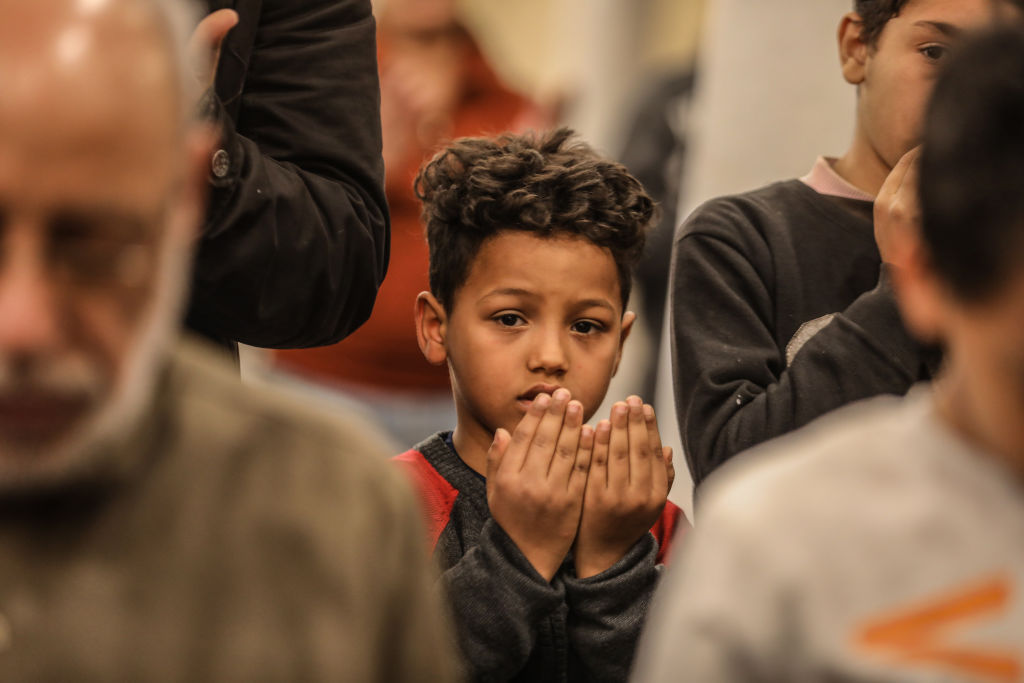Ramadan: How To Show Support For Muslims During Holy Islamic Month
Muslims perform the first ‘Tarawih’ prayer on the eve of the Islamic holy month of Ramadan at the Mosque of Amr ibn al-As in Cairo, Egypt, on March 10, 2024. | Source: Anadolu / Getty
UPDATED: 9:30 a.m. ET, March 11, 2024
The observation of Ramadan in Islamic culture began on Sunday night and will last all month long, with festivities expected to soon be popping off across the globe ahead of the commencement celebration of Eid al-Fitr.
MORE: Ramadan: How Public Schools Are Recognizing The Sacred Islamic Month
For those on the outside looking in, it’s easy to see that many Muslims across the world have been using the sacred period of fasting, prayer, reflection and community to make this particular Ramadan a memorable one.
That was even true in Gaza, which has been under siege as Israel continues attacking innocent women and children.
A video of the first suhoor of Ramadan in the tents of displaced people in Rafah, Gaza pic.twitter.com/e8qvSId6J8
— War Monitor (@WarMonitors) March 11, 2024
Ramadan is leaving, please take care of your Imaan! pic.twitter.com/MbRYfNaWOi
— Islam facts (@guidinglost) April 19, 2023
MORE: 6 Important Things To Know About Ramadan
Those celebrating and observing Ramadan are expected to simply protect their belief in the six articles of faith, which include the initial belief in Tawhid or the oneness of God, belief in the angels, belief in God’s work in creating the Holy books, belief in the existence of prophets, belief in the Day of Judgment and finally the belief in Qadar or in other words divine destiny. When you add not eating or drinking from dawn until dusk into the mix, not to mention the individual burdens that Muslims, including those in the United States, can face when balancing cultural traditions alongside Western ideologies, the month-long journey definitely doesn’t come without its fair share of trials and tribulations. That’s why we wanted to put together a helpful guide that breaks down how you can support someone of Islamic faith in your life just by understanding what this past month has meant for them.
Mohammad Hassan Khalil, a professor of religious studies and the director of the Muslim Studies Program at Michigan State University, previously explained the significance of Ramadan:
Ramadan is a period of fasting and spiritual growth and is one of the five “pillars of Islam” – the others being the declaration of faith, daily prayer, alms-giving and the pilgrimage to Mecca. Able-bodied Muslims are expected to abstain from eating, drinking and sexual relations from dawn to sunset each day of the month. Many practicing Muslims also perform additional prayers, especially at night, and attempt to recite the entire Quran. The prevailing belief among Muslims is that it was in the final 10 nights of Ramadan that the Quran was first revealed to the Prophet Muhammad.
From respecting changes in behavior that can often be triggered by the circumstances of fasting, to understanding that not all Muslims are alike, take a minute to view Ramadan from a whole new perspective.
MORE: Ramadan: How Public Schools Are Recognizing The Sacred Islamic Month
Keep scrolling as we send a special Mashallah to the completion of another successful Ramadan with a guide on supporting our Muslim brothers and sisters out there and their fruitful culture.
The post Ramadan: How To Show Support For Muslims During Holy Islamic Month appeared first on NewsOne.

